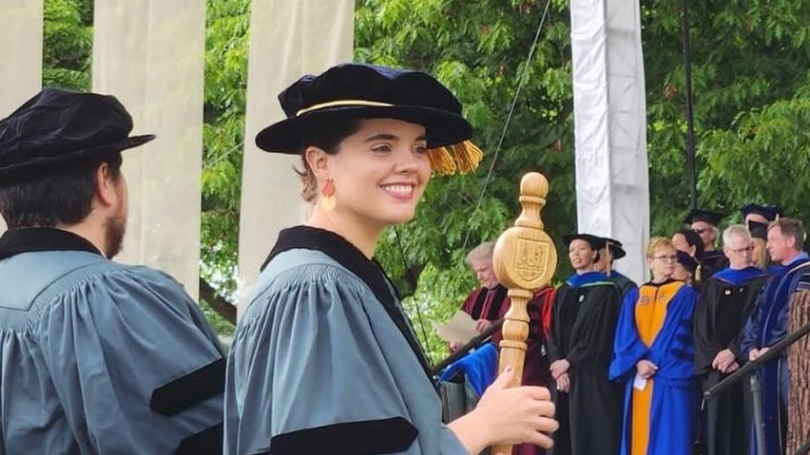What do you consider your hometown?
Westchester in Miami, Florida
Where did you earn your undergraduate degree?
Florida International University in Miami, FL
What is your program at Dartmouth?
The Molecular and Cellular Biology Department's program in microbiology and immunology.
Why did you choose Dartmouth to pursue your degree?
I chose Dartmouth because of the location and community.
Born and raised in Miami, Florida, the rural and outdoor environment of Hanover, NH was really new and exotic to me. I wanted to experience a new way of life and explore new hobbies.
During my interviews, I found the graduate students at Dartmouth to be the most engaging and friendly, and the PIs were welcoming and excellent communicators (particularly Deb Hogan, George O'Toole, Dan Schultz and Dean Madden). Additionally, there were multiple labs conducting research that aligned with my interests, which is crucial for a graduate program that requires rotations in the first year to find a suitable lab.
What is your area of research and what inspired your research?
My research focuses on how microbiota establish in the gut and affect their host's immune responses through the gut-lung axis, particularly in the context of cystic fibrosis in infants.
My inspiration for this research began during my undergraduate studies when I explored the relationship between legumes and their relationship with the soil bacteria, rhizobia. I was fascinated by how plants and bacteria evolved to work together and how these interactions could be traced back to their genes. This experience sparked my interest in studying similar interactions in humans.
The rapidly growing field of gut microbiome research, with its expanding knowledge and technology, has been incredibly exciting. Additionally, the translational aspect of my work, which involves close collaboration with CF physicians, caretakers, nurses, and researchers, drives me and keeps me motivated despite the challenges of graduate school.
What professional career path do you hope to take after graduation?
I'm very excited to be starting a postdoc right here at Dartmouth in Jen Bomberger's lab later this summer!
I'll be joining her on a new project focused on understanding how the nutritional environment in the gut can affect lung function. She's an outstanding mentor and scientist, and I'm thrilled to work with her to advance our understanding of how the gut's ecology - comprising microbiota, dietary nutrients, immune cells, and metabolites - can drive important functions in the lungs.
Additionally, I will continue to explore the possibility of a startup, leveraging the training I've received through Dartmouth's PhD Innovation Program. My longterm goal is to contribute significantly to the lives of patients with CF and other gut-related diseases, and to help translate the incredible science being conducted into clinical applications to directly benefit patients and their families.
What did you like best about your time at Dartmouth?
Oh man. There's so much! I love the community that I formed here - both in research and outside of the lab. I work with an awesome team of gut microbiome scientists that I look forward to collaborating with for decades to come.
I've also made wonderful friends in the area, both through MCB and the Innovation Program! Not to mention I met my husband Jake Holt, a fellow graduate student, in MCB! I also have loved the confidence I gained in myself - feeling like I belong, knowing I can contribute, and understanding my strengths and weaknesses. The personal growth I experienced during grad school was completely unexpected but highly rewarding.
What advice do you have for incoming students?
The time flies by quickly, so make the most of it!
- Attend talks and ask questions, no matter how irrelevant you might think they are.
- Read extensively about your field, and share papers with your PI and peers.
- Engage with your colleagues - ask how they're doing and say hi to people in the hallway.
- Attend talks in other fields and explore the campus, go on walks around Occom Pond.
- Get involved by joining a club and voting in GSC and Union ballots.
- Have difficult conversations and be proactive with your research and relationships, both professionally and personally.
